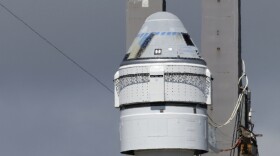-
MOSI's new planetarium takes the place of the IMAX theater, which hasn't been used since 2017.
-
Pending confirmation by the Senate, space policy expert and educator Greg Autry will play an influential role in shaping the financials and future of the federal agency.
-
The space agency determined that the material was a metal alloy stanchion used on "NASA flight support equipment."
-
After years of delay, Boeing's Starliner is flying people for the first time with two NASA astronauts heading to the International Space Station. The rocket lifted off from Cape Canaveral.
-
NASA is shifting the way the Hubble Space Telescope points. The change is a work-around for a piece of hardware that's become intolerably glitchy. Officials say Hubble will continue to do 'ground breaking science,' for about another decade.
-
$3.2 million will go toward three projects to develop technologies used to eliminate blue-green algae.
-
The plan was approved at a meeting of the Board of Trustees Finance Committee on Wednesday. University officials emphasize this plan is "very very preliminary."
-
Boeing is now aiming for its first astronaut launch at the beginning of June. Officials for the company and NASA said Friday that weeks of review show that the capsule can safely fly with two test pilots, despite a small propulsion system leak.
-
Vickie Kloeris has served 34 years in the food systems department at the agency. She has created and tested numerous meals for astronauts on the Shuttle program and the International Space Station.
-
Researchers and farmers continue the search for long-term solutions to an insect-spread illness called laurel wilt.
-
Boeing is finally poised to launch astronauts to the International Space Station for NASA after years of delays and stumbles.
-
Boeing's Starliner program has been plagued with delays and design problems for several years.
-
How do Aedes female mosquitos find the perfect site to lay their eggs? FIU researchers find they rely on one another for good reviews of breeding sites.
-
The Eta Aquarids, named for the constellation of Aquarius, may be seen in the early morning this Saturday, Sunday and Monday.

















